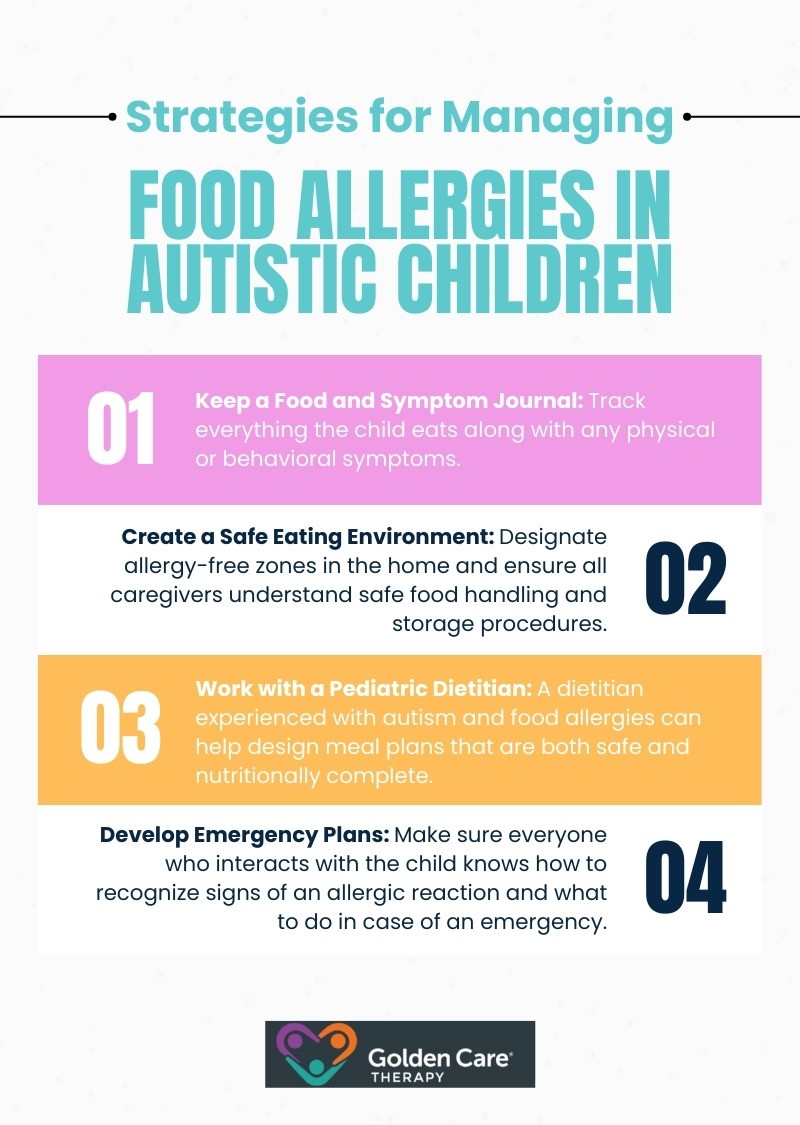Research indicates that children with autism are at an increased risk of developing food allergies. Specifically, autistic children are more than twice as likely to experience food allergies compared to their typically developing peers.
Based on statistics, 11.25% of children with autism have food allergies, while only 4.25% of typical children are affected.
This discrepancy suggests a potential link between autism and food allergies. The overlap in prevalence raises questions about the underlying causes, which may include shared genetic factors and immune system irregularities present at birth. These factors could contribute to both conditions, indicating a relationship between autism spectrum disorder and certain allergies.
Additionally, findings show that children with various allergies are significantly more likely to be diagnosed with autism than those without these allergies.
Understanding the Link
Research suggests that there may be a connection between autism and food allergies, particularly in children with autism.
Allergies and autism could potentially share common genetic roots or underlying factors, which include immune irregularities at birth and neurodevelopmental behavioral disorders. These shared factors hint at a complex relationship between these two conditions.
A comprehensive study involving nearly 200,000 children revealed a significant association between autism and various allergies. Although this research is pivotal in establishing a connection, it is essential to note that it does not imply that autism leads to food allergies.
Instead, the findings suggest that both conditions may be influenced by similar genetic and environmental influences.
That said, here are some potential genetic and environmental factors that may link autism and food allergies:
- Genetic Predisposition: Inherited traits that may make children more susceptible to allergies and autism.
- Immune System Irregularities: Potential immune dysfunctions present at birth that could contribute to the development of both conditions.
- Environmental Influences: Factors such as exposure to certain toxins or dietary components during pregnancy or early childhood that may affect development.
- Neurodevelopmental Disorders: Shared behavioral characteristics that could overlap between autism and allergy conditions.
Understanding these factors can help parents and caregivers navigate dietary choices for children with autism and food allergies. Recognizing that genetics and environment play crucial roles may assist in developing effective strategies for managing both conditions.
One study highlights that boys with autism are more susceptible to respiratory and skin allergies compared to their typically developing peers. Additionally, it was found that children with food, skin, and respiratory allergies have a higher likelihood of having autism than those without.
The prevalence rates of allergies among the participants revealed interesting patterns. Based on the findings, autistic children have higher prevalence rates of food allergies (11.25%), respiratory allergies (18.73%), and skin allergies (16.81%) compared to children without autism, whose rates are significantly lower.
Moreover, the study showed a consistent and significant association between food allergies and autism across various age, sex, and racial/ethnic subgroups.
This research underscores the importance of awareness regarding dietary restrictions and allergy management in children with autism, leading to more informed health decisions for their care.
Possible Explanations for the Connection
To better understand why food allergies are more common in autistic children, researchers have focused on several likely contributing factors. These include genetic predisposition, immune system irregularities, environmental triggers, and the interplay between neurodevelopment and physiology.
For starters, genes greatly influence how a child’s immune system develops and responds to substances in the environment. Children who inherit certain genes may be more likely to have both autism and allergies.
For instance, genes related to inflammation or immune system regulation might make the body more prone to reacting strongly to certain foods, while also affecting brain development and behavior.
Some studies also suggest that the immune systems of autistic children behave differently from those of other children, even from birth. These irregularities can result in higher sensitivity to allergens and a tendency toward inflammation. An overactive immune response could play a role in both allergic reactions and the neurological differences seen in autism.
Moreover, exposures during pregnancy or early infancy, such as air pollution, heavy metals, or certain chemicals in the home, may influence both brain development and immune system functioning.
Even factors such as maternal diet during pregnancy or early introduction of allergens may affect a child’s likelihood of developing food allergies or autism.
Some behaviors commonly seen in autistic children, such as oral fixation or limited diets, may interact with allergy risk in complex ways. For example, children who stick to a restricted set of foods may have a higher chance of reacting when introduced to new foods.
Conversely, food allergies can lead to even more selective eating habits, reinforcing a cycle of dietary restriction.
These explanations don’t provide a single answer, but together they highlight the complex nature of the relationship between autism and food allergies. For parents and caregivers, this means that both conditions should be monitored and managed thoughtfully, with awareness of how one can influence the other.

Challenges in Diagnosing Food Allergies in Autistic Children
One of the biggest hurdles families face is identifying food allergies in autistic children. Unlike neurotypical children, autistic individuals may have difficulty expressing what they feel.
A child might not say “my stomach hurts” or “my throat feels itchy.” Instead, symptoms of food allergies might appear as behavioral changes.
A child with autism who is having an allergic reaction might suddenly become more irritable, have trouble sleeping, or experience a spike in meltdowns or repetitive behaviors. These changes can be misinterpreted as just part of the child’s regular autism-related challenges.
Without clear communication or visible signs like hives or swelling, it can take longer for caregivers to recognize that the problem is allergy-related.
Another challenge is distinguishing between food intolerance and a true allergy.
Food intolerances, such as sensitivity to dairy or gluten, don’t trigger an immune response, but they can still cause uncomfortable symptoms like bloating or headaches.
Since autistic children often have gastrointestinal issues, it can be difficult to pinpoint whether their symptoms are caused by a true allergy, an intolerance, or something else entirely.
How to Manage Food Allergies in Autistic Children
Once a food allergy is diagnosed, managing it can be more complicated for children with autism.
Many autistic children have sensory sensitivities or strong food preferences. They may only be willing to eat a very limited range of foods, which makes avoiding allergens more difficult.
If a child is allergic to a food that is one of their few accepted items, it can create a stressful situation for both the child and the caregiver.
Successful allergy management requires a combination of medical guidance, behavioral support, and nutritional planning. Pediatricians, allergists, dietitians, and occupational therapists may all need to work together to ensure the child is receiving a balanced diet without being exposed to harmful allergens.
Caregivers must also be especially cautious with cross-contamination. Even trace amounts of an allergen can trigger reactions, so kitchens and eating environments need to be closely monitored.
For children with severe allergies, caregivers may need to carry epinephrine auto-injectors at all times and educate others on how to use them.
That said, here are some practical steps that can help families manage food allergies in autistic children:

While the connection between autism and food allergies is increasingly recognized, researchers are still working to understand it fully. Ongoing studies are looking at how gut health, brain function, and immune responses are interrelated.
Some researchers are also exploring whether early interventions, such as probiotics, special diets, or immune therapies, might help reduce the impact of allergies or support healthier development in autistic children.
Until more is known, the best course of action for parents and caregivers is to stay informed, work closely with medical professionals, and pay attention to the child’s individual needs. Each child is different, and what works for one family may not work for another.
The Bottom Line
For parents and caregivers of children with autism, understanding and managing food allergies is a crucial part of ensuring overall health and well-being. The higher rate of food allergies in autistic children means that extra vigilance is needed when it comes to diet and nutrition.
While the relationship between autism and allergies is complex and still being studied, the evidence suggests that the two conditions are often linked through shared biological and environmental influences.
Learning more about this connection and adopting thoughtful strategies for diagnosis and management are crucial as they allow families to help their children lead healthier, safer lives.
With patience, support, and the right resources, it’s possible to navigate these challenges while continuing to support the unique strengths and needs of children with autism. At Golden Care Therapy, we’re proud to provide high-quality, personalized ABA therapy in New Jersey, Indiana, New York, Georgia, and Florida.
We have a dedicated team that works closely with families to ensure every child receives compassionate care tailored to their individual needs. Reach out to us today to learn how we can support your family’s journey.
Sources:



